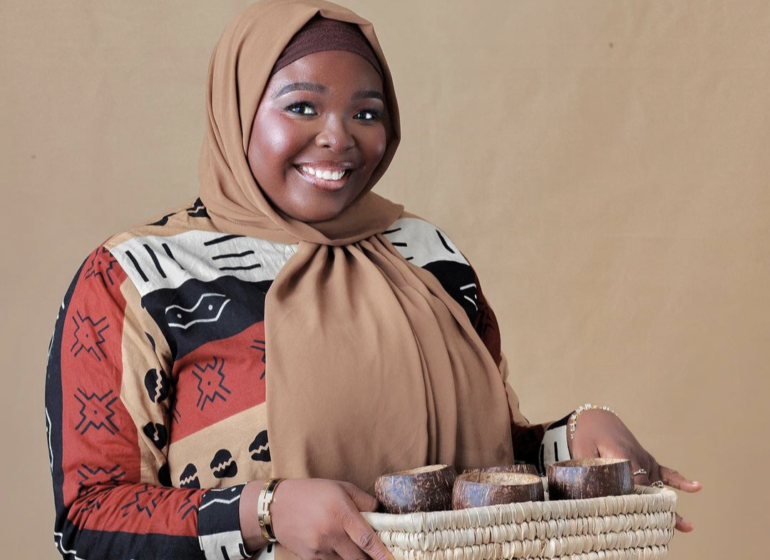In a world where sustainability meets creativity, Olanike Taofeeqah Okunlola stands out. This agriculture graduate from the University of Ibadan has carved a unique niche by transforming discarded coconut shells into stunning tableware. Her creations include cups, bowls, cutleries, and accessories. She discovered her passion for crafting during one of the many ASUU strikes. What began as a hobby soon evolved into a full-fledged business, breathing new life into waste. In this interview with TheCable Lifestyle’s Muhibat Sulaimon, Olanike shares her journey, the inspiration behind her creations, and the challenges she has faced in building her business.
TheCable Lifestyle: How did you get into crafting with coconut shells, what inspired the creativity?
Olanike: When I was in 300 level, we went on one of those many ASUU strikes so when I was home everything was just there, I had nothing doing. During that period, my aunt watched a video on how to do coconut oil telling us to try it. So I said let me also see how it is done if I can make something out of it. We tried it and it came out nice. I said to myself that when I resume school I will also commercialise it so I sold coconut oil till my service year. When we were about rounding up the service year, I was really scared on what to do after service.
Also, the house I was staying during my service year, my landlady didn’t allow me throw away the coconut shell from the coconut oil production in the compound waste bin. So I kept piling the coconut shells up in a sack. One day, one of my neighbor told me about a video she saw on online on coconut shells so I told her to show me if it’s something I can try. That was early 2022. When I saw it, I wasn’t sure if I could do it but I kept on trying till I could make coconut bowls and accessories. So that’s how I started crafting with coconut shells.
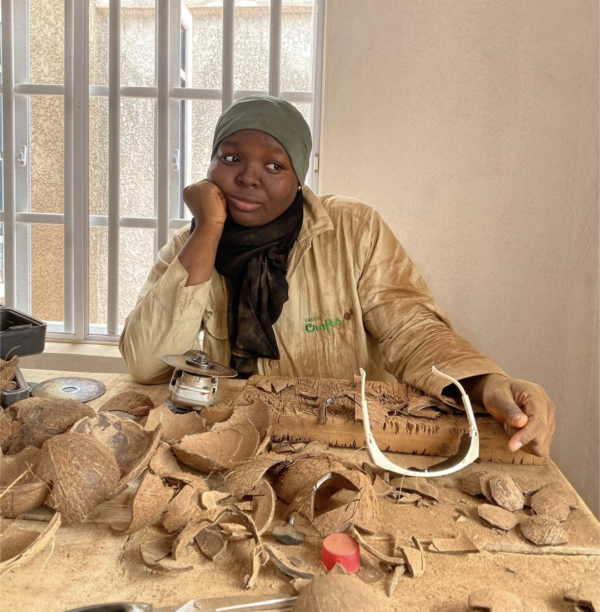
TheCable Lifestyle: Are you self-taught?
Olanike: Yes, I’m
TheCable Lifestyle: How has been the experience so far?
Olanike: There have been different experiences, highs and lows. Most people have not seen something like that before so they get amazed and curious. So I will consider that as the highs. For the lows, when I started, I started with the coconut bowl so people viewed it in a way. They felt it traditional like all those calabashes used for sacrifice.
There was a time someone bought the bowl as a birthday gift for her friend so when the rider went to deliver it, the friend was not around so he had to deliver to the mum. The mum insisted the rider opened it and when he did she wanted to arrest him that who sent him to bring calabash to her child. However, I guess with awareness and just trying to create things, people are beginning to see it in a different light.
TheCable Lifestyle: How do you source for raw materials?
Olanike: I mentioned starting off with coconut oil so till now it that part that is fuelling the craft part of the business. But now I’m not really producing coconut oil like I used to because people are now appreciating the craft. So now some people just come to me telling me they have coconut tree in their house and can keep shells for me. Some will say they have a Hausa man in their area that sells coconut where they can help me collect coconut shells from. But the thing is it is not all coconut shells that can be used to craft because there is a degree of thickness the shell has to have to enhance the durability of the product.
Recently, I came across someone on Instagram who makes coconut snacks so I discussed with her, now she helps me source coconut shells and I buy from her. She send it to me in Ibadan from Ijebu Ode. Different people have also been reaching out to sell shells to me.
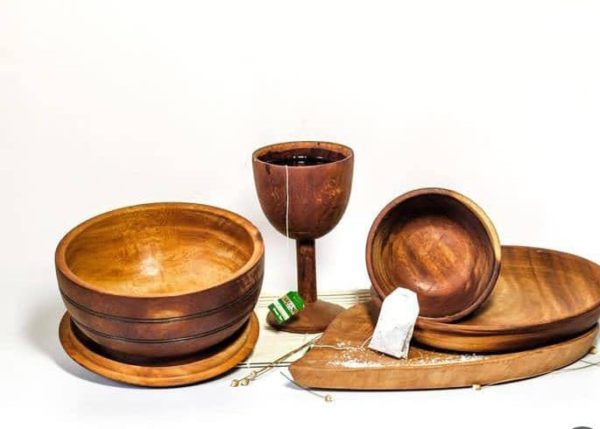
I have also thought about doing something along environmental sustainability. Anyone who can source coconut shells, the highest number of bags get a price. But for now, I basically get shells from people willing to gift me and the lady I buy from.
TheCable Lifestyle: How long does it typically take to create a product?
Olanike: Usually, whenever someone wants to make an order on key holders, I give them one or two weeks for production depending on the quantity they are ordering. If I want to craft key holder from start to finish, I can make like 100 key holders in a day.
I think over the years I have been able to perfect my craft so I don’t spend lot of time on them anymore. For bowls, I can craft like five on a day. Now I also have a staff so it takes even less time.
TheCable Lifestyle: Could you briefly explain the process?
Olanike: After sourcing for shells, I sort them to get the ones that are good enough for production. So, for key holders, we decide the shape, map it out then we cut and file it. We also customise if it it require customisation then we polish and add the finishing touches.
TheCable Lifestyle: What tools, and techniques do you use to work with these shells?
Olanike: When I started, everything I was using was manual. A hacksaw, that time I couldn’t afford a drill so I was using an iron cloth hanger. I will put it in fire so I will be able to drill hole in the coconut. Those were basically what I used to get hang of the craft before buying machines that will make the process faster. Now we make use of angle bender, hacksaw, hand drill and laser engraver. Those are the major tools we used.
When I started, I was also outsourcing customisation, I will have to go a man’s place who helps with. He sometimes disappoints, then I just decided to get the machine so I will be able to serve customers better. Since then, production has been so much better and easier.
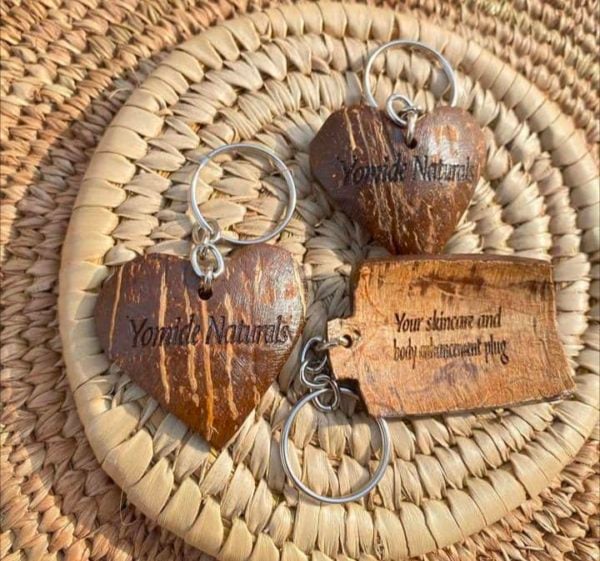
TheCable Lifestyle: Has the current economy affected your business in any way?
Olanike: Whenever I hear business owners complain about hike in prices, I understand but to some extent I can’t relate. This is because the things I use for crafting are not exactly things I buy, I deal with waste. Apart from the polish, chains I used for the key holders, every other thing I craft I can make them with coconut shells. So I can control my prices, there are some products that still have the same price since I started.
However, I wouldn’t say it isn’t affecting me especially with fuel. We need fuel for crafting due to unstable electricity. To an extent, I can still control the economy’s effect on my business.
TheCable Lifestyle: There is the mindset that handcrafted products are expensive. How have you been able to navigate that?
Olanike: I try not to look desperate to customers because when you are trying to do too much they will misinterpret you. So I try to explain the skill and time that goes into crafting the products.
TheCable Lifestyle: What challenges have you faced so far and how did you overcome them?
Olanike: Asides the perception of people about the coconut bowl that I mentioned earlier, it will be the price of fuel. There was a time I bought fuel for 1k per litre, so period like that I try to take a break because I believe it won’t last forever.
Also, when pricing my products I try to put in consideration my profit and the unstable economy. Like that, I don’t change products prices frequently.
There was also a time I wasn’t getting coconut shell. When I started, I never thought that would be an issue but it turned out to be one of the major challenges I faced. It felt like as people started getting to know my brand, coconut was going into extinction. I wasn’t getting enough shells to produce and that was when I started reaching out to people.
TheCable Lifestyle: How do you intend to scale your business?
Olanike: In the aspect of expanding the brand, I have a couple of products I want to add to the brand. I feel like the accessories part of the craft is more appreciated. When I started out, the first product I launched was the coconut bowl but the acceptance was low. Then I started making key holders and necklaces and I noticed people really appreciated the necklaces, bracelets. So I intend to make more of accessories like earrings, necklaces and bracelet. That’s the plan for now.
TheCable Lifestyle: Is the business registered?
Olanike: No, it is not but it is in process. Before now, I never saw a reason to register the brand because everyone I know that registered their business did not show its advantage. They just do it and post on social media, no one was talking about the benefit. Until I wanted to apply for a grant last year and having a corporate account and registration is part of the criteria so that was when I took it seriously.
TheCable Lifestyle: Do you brand your products as Nigerian-made or foreign-made?
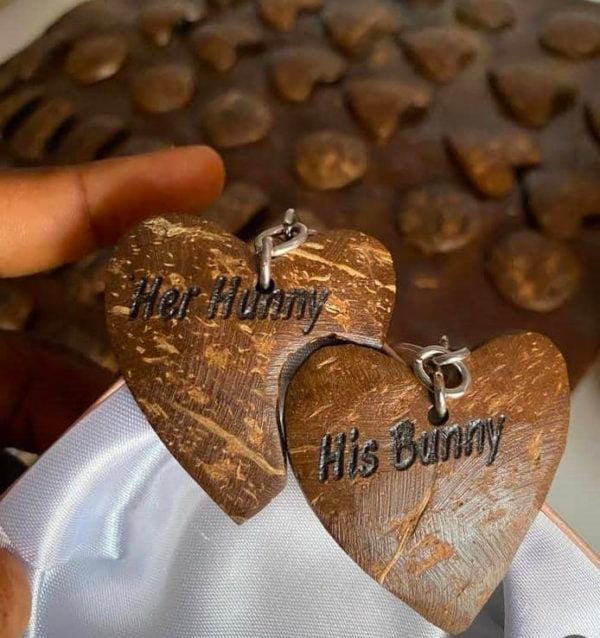
Olanike: I have never branded my products as a particular country made, I just call it hand crafted products.
TheCable Lifestyle: What is most rewarding about your business?
Olanike: I would say the opportunities that come with how unique the business is. I have applied for two grants and I won both and I think it’s because people have never seen something similar. Whenever people see it they are amazed so I feel that gives me an edge over other businesses.
TheCable Lifestyle: What are your hopes, aspirations and future plans?
Olanike: I feel like my business is affecting my personal life. My plan after school was to go for masters, I really desire the certificate. Even though the business has been growing, I still feel empty in that aspect. So for me to achieve my personal goals and still grow my business, one of the major plans is to grow a workforce that can function in my absence, people I can train to work for me.
Copyright 2025 TheCable. All rights reserved. This material, and other digital content on this website, may not be reproduced, published, broadcast, rewritten or redistributed in whole or in part without prior express written permission from TheCable.
Follow us on twitter @Thecablestyle

